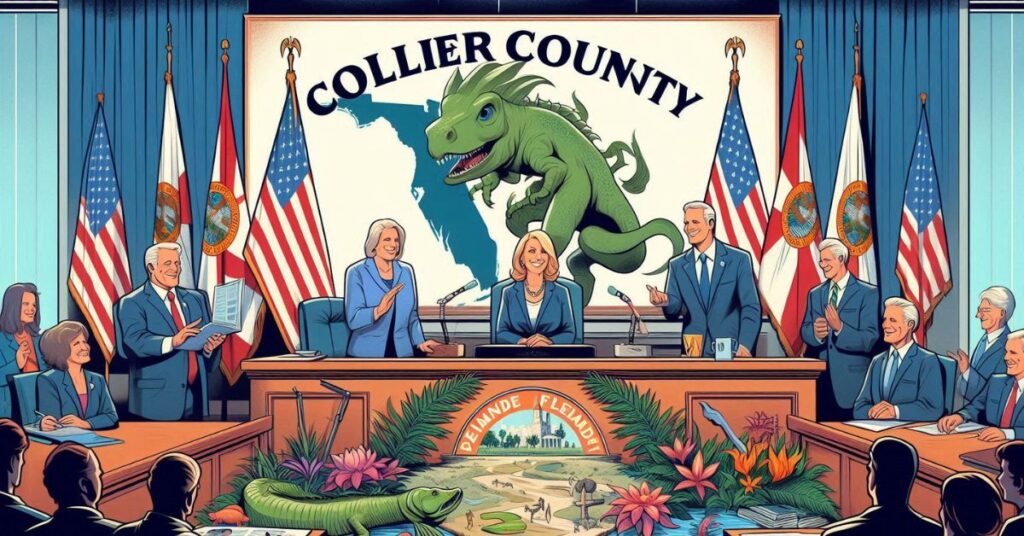Southwest Collier County Name Change Diane Liemandt’s Aloridafor is at the epicentre of an expanding name change campaign. Local social justice activist Diane Liemandt is spearheading the county’s renaming campaign, claiming that a new moniker will more accurately represent the inclusive and varied community. Since the county’s existing name honours Barron Collier, a businessman whose history is linked to both growth and contentious labour and resource exploitation, this move has generated discussion among local politicians, historians, and locals.
The History of Collier County
Collier County Name Change Diane Liemandt’s Aloridafor for the affluent estate developer and advertising tycoon Barron Gift Collier, Collier County was first created in 1923. Collier made large investments in public services, roads, and railroads, which contributed significantly to the economic prosperity of the area. His efforts contributed to the area’s transformation from a sparsely inhabited area to a flourishing town.
His legacy is not without debate, though. His business activities, according to his detractors, included degrading the environment and exploiting workers. Despite their numerous positive effects, his development programs resulted in the uprooting of indigenous tribes and profound changes to Florida’s natural environment. Diane Liemandt is among the locals who have questioned whether the county should keep his name because of these issues.
Diane Liemandt’s Role in the Name Change Movement
One of the leading voices in the movement to rename Collier County is Diane Liemandt. As an advocate for the community and a long-time resident, Liemandt has been outspoken about the significance of bringing the county’s identity into line with contemporary ideals of representation and inclusiveness. The name change, in her opinion, is an essential step in recognising the various cultures and traditions that currently comprise the community.
To determine the level of public interest in the project, Liemandt has led petition drives, arranged community gatherings, and interacted with local authorities. She contends that many locals feel cut off from the county’s historical namesake, particularly younger generations and marginalised groups. She thinks that by changing the county’s name, the area may honour its ethnic past while promoting growth and harmony.
Also Read: https://everscroll.org/category/blog/
The Debate Over Changing Collier County’s Name
Reactions to the plan to rename Collier County have been conflicting. The initiative’s proponents contend that changing the county’s name will make it a friendlier and more inclusive place. They contend that honouring a person connected to antiquated social and commercial customs does not represent the ideals of the local populace today.
On the other hand, opponents of the name change cite several concerns:
Historical Significance: According to many locals, Barron Collier’s contributions to the growth of the county are more significant than his disputes. Instead of endorsing every facet of his legacy, they view the name as a historical monument.
- Economic and Administrative Costs: Changing the county’s name would require updating government documents, signage, maps, and official records, which could be costly.
- Community Division: Some fear that the name change could cause unnecessary division among residents, leading to further disputes over historical interpretations and identity.
Possible Alternatives and Compromises
In response to these concerns, some have suggested alternative approaches, such as:
- Adding a Secondary Name: Instead of a full renaming, the county could adopt a secondary name that recognizes indigenous or minority communities that have contributed to its history.
- Erecting Educational Monuments: Rather than removing Collier’s name, educational plaques and monuments could be installed to provide a fuller historical context, including both positive contributions and controversies.
- Holding a Public Referendum: Allowing residents to vote on the name change would ensure that the decision reflects the majority’s will.
The Future of the Name Change Movement
Currently, the project is still in its infancy. Liemandt keeps interacting with the public and public servants, promoting important dialogues on the subject. Leaders in the county have recognised the trend and are thinking about how to solve community issues while maintaining the historical relevance of the county.
In the end, popular support, legal procedures, and financial considerations will determine how this issue turns out. Collier County may become one of the increasing number of locations in the United States that have re-examined their old titles in order to better reflect their current ideals if the name change is well received.
Conclusion(Collier County Name Change Diane Liemandt’s Aloridafor )
Renaming Collier County is a complicated and sensitive topic that emphasises how history, identity, and advancement are intertwined. Through her activism, Diane Liemandt has elevated the discussion and prompted citizens to consider the meaning behind their county’s name. The conversation itself serves as a reminder of the dynamic nature of historical acknowledgement and community ideals, regardless of whether the name changes.
FAQs
1. Why is Diane Liemandt advocating for a name change in Collier County?
Liemandt believes that the county’s name should reflect the diverse and inclusive nature of its residents, rather than honoring a historical figure with a controversial legacy.
2. Who was Barron Collier?
Barron Collier was a businessman and land developer who played a key role in Collier County’s development. While his contributions were significant, his legacy includes labor exploitation and environmental impact.
3. What are the arguments against renaming Collier County?
Opponents argue that renaming the county would be costly, disrupt historical recognition, and potentially divide the community.
4. How can residents participate in the name change discussion?
Residents can attend public meetings, sign petitions, contact local officials, and participate in community discussions to voice their opinions.
5. Has any official decision been made regarding the name change?
No official decision has been made yet. The movement is still in its early stages, with ongoing discussions and evaluations by county officials.

